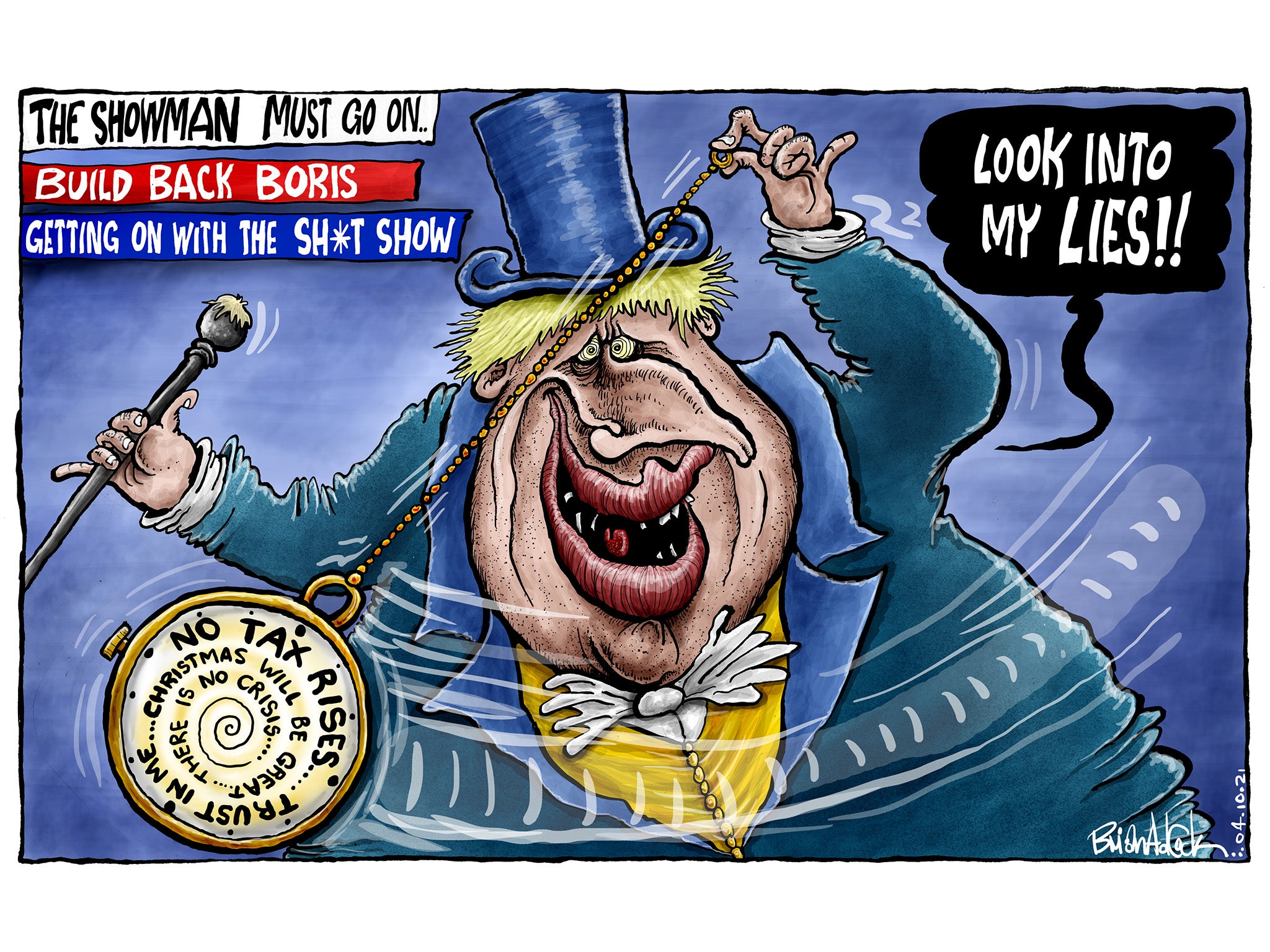It is two years since the last, proper, in-person Conservative Party conference. Two years ago, when the party gathered in Manchester, as it does again now, there was barely a square inch of wall space not plastered with three words: “Get Brexit Done.” A couple of months later, Brexit did get done. Now the party is meeting again and, as a direct consequence of Brexit having got done, the country is in the middle of a serious fuel crisis that shows precious little sign of improving. There are shortages of lots of items in supermarkets, and there are real concerns that the underlying cause of these shortages will not be alleviated in time for Christmas.
The government has spent most of the past week pretending that this problem has nothing to do with Brexit, and that other countries are facing the same problems we are, which is palpably untrue. There is no fuel crisis anywhere but here.
Johnson has, in his pre-conference interview with Andrew Marr, vaguely conceded that the problem might be vaguely Brexit-related. “When people voted for change in 2016, and when people voted for change again in 2019, as they did, they voted for the end of a broken model of the UK economy that relied on low wages, and low skill, and chronic low productivity – and we’re moving away from that,” he said.
It hardly needs to be pointed out, again, that if this was the motivating factor behind people’s decision to vote for Brexit, then Johnson is very fortunate indeed that the people who did so were wise enough to overlook the reasons he personally gave them to do so, which were untrue promises about extra money for the NHS and fears about Turkey joining the EU.
It certainly does not need to be pointed out that people did not vote to not be able to buy petrol. Nor could they have done, as that is a direct consequence of the type of deal that was done with the EU, which bears almost no relation to what was promised in 2016, nor had it even been negotiated in advance of the 2016 election.
Johnson is arguably correct that a vote to curtail freedom of movement contains within it a strong implication that it is a vote to end the availability of cheap, principally eastern European, labour. Both he and business secretary Kwasi Kwarteng have referred to the shortages as a symptom of a transition to a different economic model. But again, that is very far from the truth.
It is also true that other European countries are suffering from a shortage of HGV drivers, and that this shortage was forewarned, and it was forewarned even before British politics was consumed by Brexit.
Improved pay and conditions for HGV drivers could be one solution to the problem, but it does not deal with one crucial aspect, which is that HGV driving in Europe is, and must be, a cross-border, multinational operation. A typical HGV-driving shift rotation passes through many countries in many days. It is only very recently that a number of haulage firms have simply not wanted to include the UK on their routes, as they do not want to deal with the extra paperwork involved. (Many individual drivers also remain angry at having been effectively kettled in their vehicles on an airstrip in Kent when the “Kent variant” broke out last Christmas – a situation that was, in fairness, as much Emmanuel Macron’s fault as anybody else’s.)
This is not a problem from which Johnson can bluster his way free. Food shortages and fuel shortages are real, tangible problems. People notice them. They profoundly affect their lives. Most often in politics, and especially where Johnson is concerned, a problem can be explained away with a phoney narrative – a half-baked idea or theory that doesn’t really apply, but will provide a kind of answer to the question.
The transition to a highly skilled, high-wage economy may be desirable, but it has precious little to do with HGV driving, and it has precisely zero to do with the UK’s trade arrangements with the EU, which make life much, much harder for the people who deliver goods here.
It is anything but clear how these problems will be solved because the problem is Brexit itself, and that problem is here to stay. The solution is easy – it is to remain in the EU – but that is now impossible. And the consequences are extremely clear to see. They have been laid out as traffic cones across the entrances of most of the nation’s petrol station forecourts, and bluster cannot make them go away.




Join our commenting forum
Join thought-provoking conversations, follow other Independent readers and see their replies
Comments